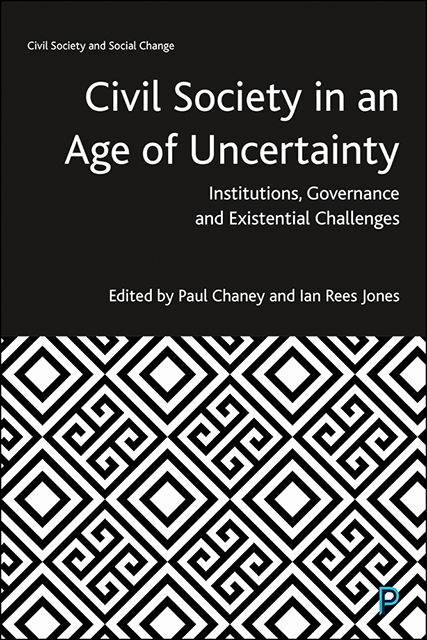Book contents
- Frontmatter
- Contents
- List of tables and figures
- Notes on contributors
- Acknowledgements
- 1 Introduction: Locating civil society
- 2 Existential challenges
- 3 Civil society and the governance of city region economic development
- 4 Civil society, pandemic and the crisis of welfare: exploring mixed economy models of welfare in domiciliary adult social care in a devolved UK
- 5 The contemporary threat to minority languages and cultures: civil society, young people and Celtic language use in Scotland and Wales
- 6 Digital threat or opportunity? Local civil society in an age of global inter-connectivity
- 7 Democratic decline? Civil society and trust in government
- 8 Xenophobia, hostility and austerity: European migrants and civil society in Wales
- 9 Meeting the challenge? Prospects and perils for civil society in the twenty-first century
- Index
8 - Xenophobia, hostility and austerity: European migrants and civil society in Wales
Published online by Cambridge University Press: 16 June 2023
- Frontmatter
- Contents
- List of tables and figures
- Notes on contributors
- Acknowledgements
- 1 Introduction: Locating civil society
- 2 Existential challenges
- 3 Civil society and the governance of city region economic development
- 4 Civil society, pandemic and the crisis of welfare: exploring mixed economy models of welfare in domiciliary adult social care in a devolved UK
- 5 The contemporary threat to minority languages and cultures: civil society, young people and Celtic language use in Scotland and Wales
- 6 Digital threat or opportunity? Local civil society in an age of global inter-connectivity
- 7 Democratic decline? Civil society and trust in government
- 8 Xenophobia, hostility and austerity: European migrants and civil society in Wales
- 9 Meeting the challenge? Prospects and perils for civil society in the twenty-first century
- Index
Summary
The last few years have often been characterised by turbulence and uncertainty. The election of populist leaders in the USA, India, Italy, the Philippines, Indonesia, Brazil and Hungary, the notable electoral performance of far-right and populist parties in France, Germany, Sweden and elsewhere, and the UK’s decision to withdraw from the European Union have seen a disruption to the established expectations of liberal-democratic states following neoliberal practice. However, these did not emerge in 2016. Austerity politics, population displacement following conflict, and climate emergencies over the previous decade and beyond – and the perceived failure of states to deal with these justly – have contributed to this condition. What is clear, however, is that the world is a less certain place on issues of migration and beyond through the unsettling of previously established norms and conventions. Furthermore, specific questions about the UK’s future relationship with the European Union pose uncertainty regarding several fields, including future movement of people.
The UK’s 2016 EU membership referendum marked the culmination of restrictive immigration legislation and policy over the last two decades. The Asylum and Immigration Act, 1999, for example, introduced a number of restrictions, including replacing monetary support for refugees and asylum seekers with vouchers, and the forcible dispersal of asylum seekers across the UK (Kofman 2002; Hubbard 2005; Darling 2011). In the following decade, Prime Minister Gordon Brown made his plea for ‘British jobs for British workers’ at his first Labour Party conference as prime minister, restrictions and surveillance were placed on marriages between UK and non-UK citizens in the UK (Mulvey 2010; Wray 2011; Yuval-Davis et al 2017), and on non-EU citizens accessing benefits and the NHS (Guentner et al 2016; Hiam et al 2018). The policing of state boundaries further encroached into everyday life with the requirement of landlords and employers to verify tenants’ and employees’ migration statuses under the Immigration Acts of 2014 and 2016 (Hall 2015; Yuval-Davis et al 2017). These developments, which constituted a policy of maintaining a ‘hostile environment’ against immigrants in the UK during Theresa May’s tenure as Home Secretary, and which placed extensive restrictions on immigrants to the UK, criticised as overly complex by the Court of Appeal of England and Wales (Yeo 2017), continued after her elevation to the premiership (Burrell and Schweyher 2019).
- Type
- Chapter
- Information
- Civil Society in an Age of UncertaintyInstitutions, Governance and Existential Challenges, pp. 163 - 185Publisher: Bristol University PressPrint publication year: 2022



